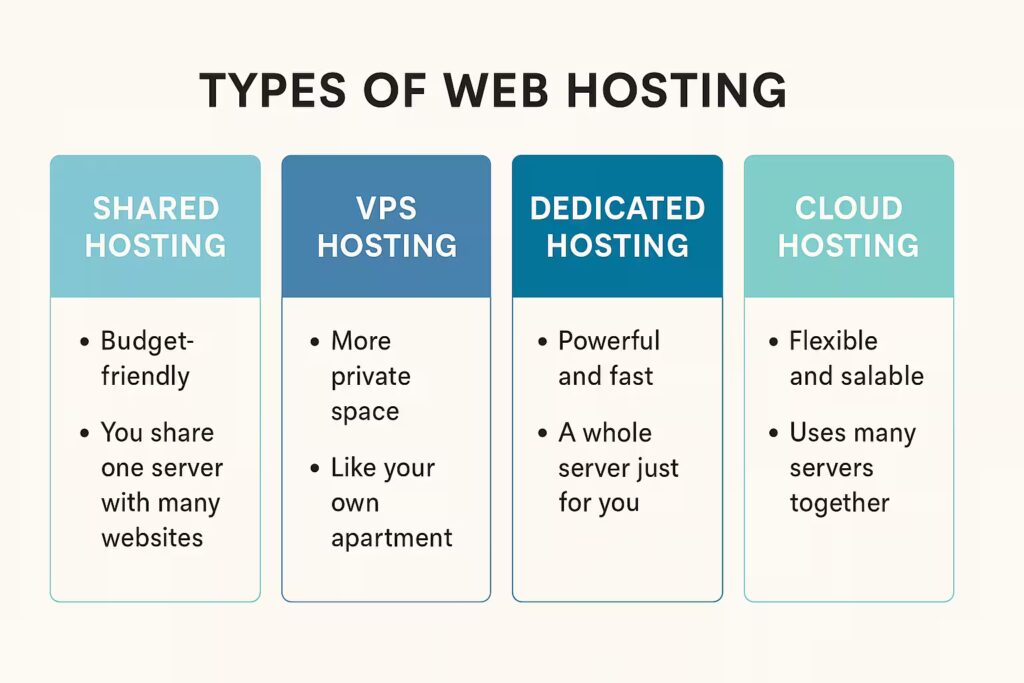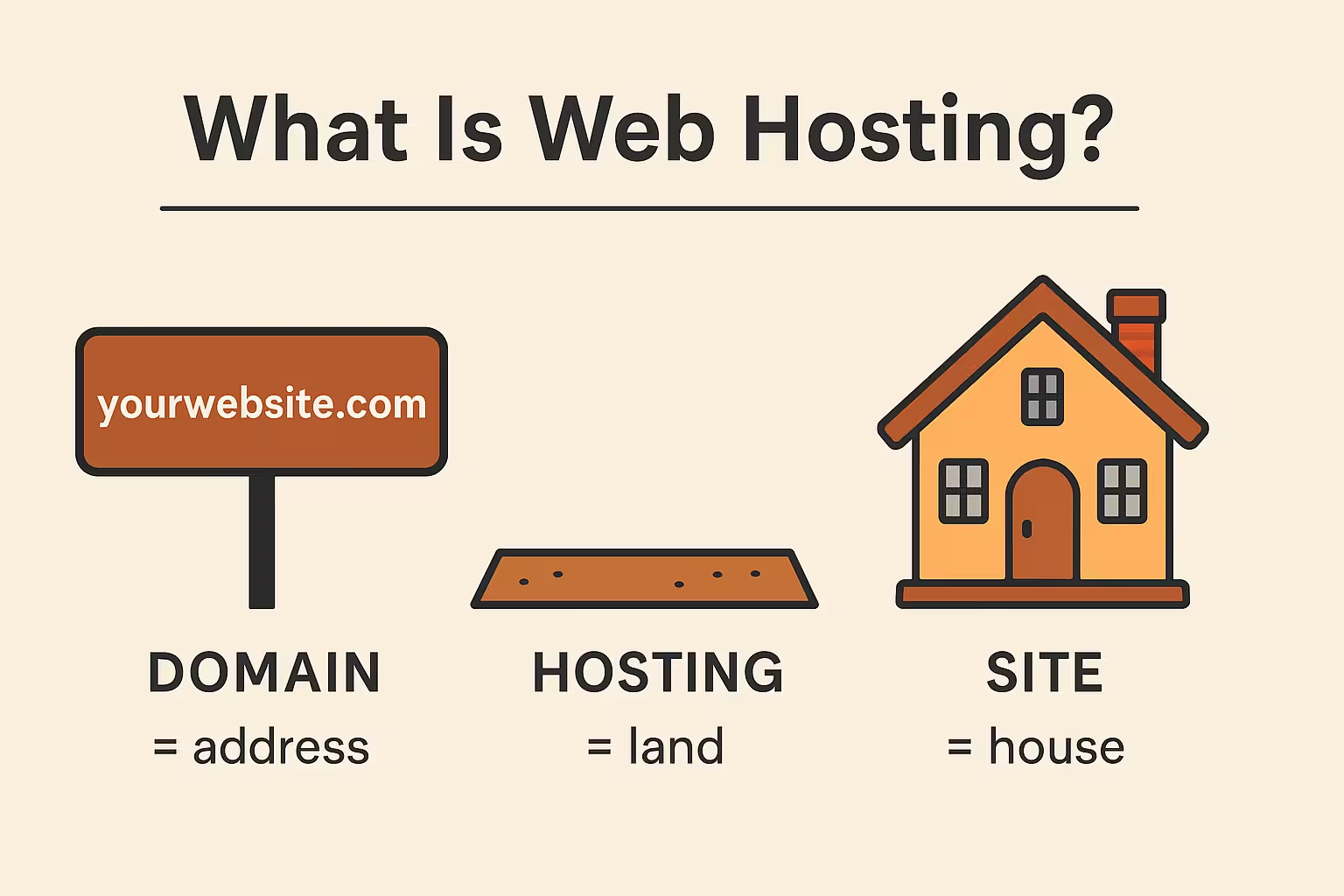What is web hosting?
Welcome to our Tech Series: Simple Answers for Non-Tech Folks
Have you ever wondered where websites “live”? When someone tells you they “host” your website, what does that even mean? If you’re confused by words like “hosting,” “server,” or “domain,” you’re not alone. A lot of people ask us the same thing.
In this article, we’ll explain what web hosting is in plain English, using simple comparisons to help you understand exactly how it works — no tech degree required.
Imagine Your Website Is a House
Let’s start with an analogy. Imagine your website is a house.
This is a popular analogy that helps make sense of hosting, domains, and web design.
- The address of the house is your domain name (ie. yourbusiness.com).
- The land the house is built on is your web hosting.
- The house itself is the website — all your text, images, pages, and tools.
So, web hosting is like the land or space where your website sits. Without it, you can’t “build” or show your website to the world.
What Exactly Is Web Hosting?
Web hosting is a service that stores your website files — like your pages, photos, copy, and videos — and makes them available to anyone who types your web address into a browser.
These files live on a powerful computer called a server, which is always connected to the internet. That way, when someone visits your site, the server “serves” (delivers) the content quickly and reliably.
Could I simply host my own website from my computer at my home?
Technically yes, but global reach, IP consistency, security, uptime are all aspects to consider. If you are one that enjoys the art of prototyping to get an idea up and running, this is a very viable and cost affective way to get started.
Example: How It Works
Let’s say you own a bakery and have a website: bestbakery.com.
- You bought the domain bestbakery.com.
- You built the website (the design, text, photos, etc.).
- Now you need a place to store that website so others can visit it.
That’s where web hosting comes in. Most common practice is to rent space on a server (a special computer) that holds your website files. When someone types bestbakery.com into their browser, the server sends your website to them instantly.
Hosting vs. Domain — What’s the Difference?
People often get these mixed up, so here’s a quick breakdown:
- Domain Name: This would be your street address (ex: bestbakery.com)
- Web Hosting: The land or plot your house (website) is built on
- Website Files: Details that fill up your home like walls, furniture, and photos inside your house (think content, images, downloads)
You need both a domain and hosting for your site to go live. The domain is how people find you, and hosting is where your website actually lives.
What Comes With Web Hosting?
Depending on your provider, web hosting usually includes:
- Storage: Space for your website files.
- Bandwidth: How much traffic your site can handle.
- Email: Create custom emails like [email protected].
- Security: Protection from hackers, malware, and spam.
- Support: Help when something breaks.
Most hosts now include automatic backups, free SSL certificates (for HTTPS), and tools to help your website load faster.
Different Types of Web Hosting (Simplified)
There are many types of hosting, but here are the most common — explained simply.
1. Shared Hosting (Budget-friendly)
- You share space with many other websites (like roommates in a house).
- It’s cheap, but can be slower or less secure if your “roommates” misbehave.
2. VPS Hosting (Private room in a shared building)
- You still share a server but get your own private space.
- Faster and more secure than shared hosting.
3. Dedicated Hosting (Your own mansion)
- You get the entire server to yourself.
- Super fast and powerful, but expensive and overkill for most small sites.
4. Cloud Hosting (Hosted across many servers)
- Uses multiple connected servers to host your site.
- Great for handling traffic spikes and keeping things running smoothly.

Is Web Hosting Secure?
It depends on the provider, but most good hosting companies offer:
- SSL certificates (shows the little padlock ???? in your browser)
- Daily backups
- Spam filtering
- Malware scanning
- Firewall protection
If your site handles private info (like payments or personal data), security is a must.
How Much Does It Cost?
Web hosting can cost anywhere from $3/month to over $300/month. Here’s a simple breakdown:
- Basic Shared Hosting: $3–10/month
- VPS Hosting: $20–80/month
- Dedicated Hosting: $100+/month
- Managed WordPress Hosting: $20–40/month (great for non-techies)
Most small businesses start with shared or managed hosting — it’s affordable and handles the basics without needing a developer on speed dial.
How to Choose a Good Web Host
Look for a hosting provider that offers:
- Fast load speeds
- Strong security features
- Helpful customer support
- Free SSL and backups
- Easy WordPress setup (if you’re using WordPress)
Bonus points if they help migrate your existing site or include domain/email management in one place.
Still Confused? That’s Okay.
Think of it like this:
“If your website was a shop, web hosting would be the building your shop is in. The domain name is your street address. And your site design is how your shop looks inside.”
You can’t open your shop without a building, and you can’t get visitors without an address.
Final Thoughts
Web hosting isn’t something you should have to worry about every day — but it’s super important behind the scenes. The right hosting keeps your site running fast, secure, and always online.
So next time someone asks, “What is web hosting?” — you’ll have a simple answer:
“It’s the space where your website lives so people can visit it online.”



